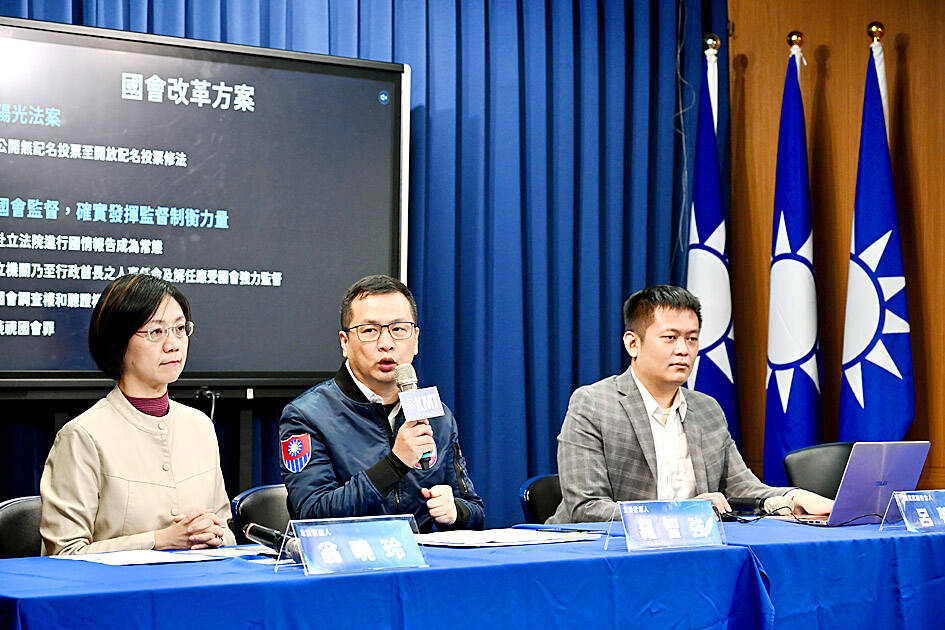Chinese Nationalist Party (KMT) legislators yesterday said they would introduce bills to increase legislative transparency and oversight of the government, while also opening the vote for speaker when the new legislature starts on Thursday next week.
The proposed measures seek to make the legislative speaker and deputy speaker election an open ballot vote, normalize presidential reports to the legislature, give the legislature oversight of personnel appointments to independent or critical governmental organizations, and enforce the legislature’s powers of inquiry.
KMT legislator-elect Lo Chih-chiang (羅智強) said that the Democratic Progressive Party (DPP) raised similar ideas in 2016, but did not implement them after gaining a majority.

Photo: Lo Pei-de, Taipei Times
“The KMT is picking up where the DPP left off,” he said.
As elections for speakers at the county and city council level are open, the Legislative Yuan should follow suit, KMT legislator-elect Weng Hsiao-ling (翁曉玲) said.
She said there was precedent in holding open ballots at the legislature, and the Supreme Court in 2015 ruled that making known who the legislator voted for to be speaker does not contravene Article 132 of the Criminal Code.
She also called for amendments to the Act on Exercising Legislative Yuan Powers (立法院職權行使法) and the Regulations on Electing the Legislative Speaker and Deputy Speaker by Legislators (立法委員互選院長副院長辦法) to reflect that an open ballot is legal.
Citing amendments to the Constitution stating that the Legislative Yuan can have the president conduct a “state of the union” address, Weng said that the phrasing should be changed from “can” to “should.”
The legislature only holds the powers to ratify appointments of those who would head independent organizations, but it should also ratify the appointments of personnel to head other critical government posts, she said, adding that the legislature should also be allowed to dismiss ministers.
Additionally, as the legislature can only obtain documents about specific individuals and cannot make inquiries, those shortcomings should be addressed in the Act on Exercising Legislative Yuan Powers, she said.
DPP caucus whip Ker Chien-ming (柯建銘) said that the DPP respects the proposals of other parties and would present its own versions.
Ker said “it is all the same” to him who among the KMT takes what position, as the DPP would have to accept them, adding that he “is confident on being able to handle legislative affairs with his 30 years in the legislature.”
Additional reporting by Hsieh Chun-lin

The manufacture of the remaining 28 M1A2T Abrams tanks Taiwan purchased from the US has recently been completed, and they are expected to be delivered within the next one to two months, a source said yesterday. The Ministry of National Defense is arranging cargo ships to transport the tanks to Taiwan as soon as possible, said the source, who is familiar with the matter. The estimated arrival time ranges from late this month to early next month, the source said. The 28 Abrams tanks make up the third and final batch of a total of 108 tanks, valued at about NT$40.5 billion

Travel agencies in Taiwan are working to secure alternative flights for travelers bound for New Zealand for the Lunar New Year holiday, as Air New Zealand workers are set to strike next week. The airline said that it has confirmed that the planned industrial action by its international wide-body cabin crew would go ahead on Thursday and Friday next week. While the Auckland-based carrier pledged to take reasonable measures to mitigate the impact of the workers’ strike, an Air New Zealand flight arriving at Taipei from Auckland on Thursday and another flight departing from Taipei for Auckland on Saturday would have to

A group from the Taiwanese Designers in Australia association yesterday represented Taiwan at the Midsumma Pride March in Melbourne. The march, held in the St. Kilda suburb, is the city’s largest LGBTQIA+ parade and the flagship event of the annual Midsumma Festival. It attracted more than 45,000 spectators who supported the 400 groups and 10,000 marchers that participated this year, the association said. Taiwanese Designers said they organized a team to march for Taiwan this year, joining politicians, government agencies, professionals and community organizations in showing support for LGBTQIA+ people and diverse communities. As the first country in Asia to legalize same-sex

MOTIVES QUESTIONED The PLA considers Xi’s policies toward Taiwan to be driven by personal considerations rather than military assessment, the Epoch Times reports Chinese President Xi Jinping’s (習近平) latest purge of the Chinese People’s Liberation Army (PLA) leadership might have been prompted by the military’s opposition to plans of invading Taiwan, the Epoch Times said. The Chinese military opposes waging war against Taiwan by a large consensus, putting it at odds with Xi’s vision, the Falun Gong-affiliated daily said in a report on Thursday, citing anonymous sources with insight into the PLA’s inner workings. The opposition is not the opinion of a few generals, but a widely shared view among the PLA cadre, the Epoch Times cited them as saying. “Chinese forces know full well that